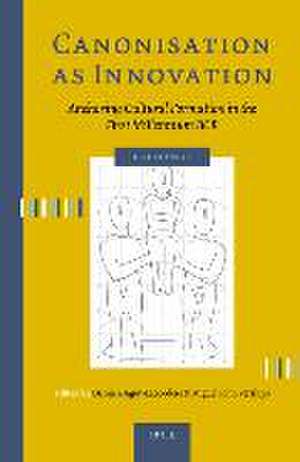Canonisation as Innovation: Anchoring Cultural Formation in the First Millennium BCE: Euhormos: Greco-Roman Studies in Anchoring Innovation, cartea 3
Damien Agut-Labordère, Miguel John Versluysen Limba Engleză Hardback – 21 sep 2022
Preț: 560.99 lei
Preț vechi: 684.14 lei
-18% Nou
Puncte Express: 841
Preț estimativ în valută:
107.38€ • 116.68$ • 90.26£
107.38€ • 116.68$ • 90.26£
Carte indisponibilă temporar
Doresc să fiu notificat când acest titlu va fi disponibil:
Se trimite...
Preluare comenzi: 021 569.72.76
Specificații
ISBN-13: 9789004520257
ISBN-10: 9004520252
Dimensiuni: 155 x 235 mm
Greutate: 0 kg
Editura: Brill
Colecția Brill
Seria Euhormos: Greco-Roman Studies in Anchoring Innovation
ISBN-10: 9004520252
Dimensiuni: 155 x 235 mm
Greutate: 0 kg
Editura: Brill
Colecția Brill
Seria Euhormos: Greco-Roman Studies in Anchoring Innovation
Notă biografică
Miguel John Versluys, Ph.D. (2001), Leiden University, is Professor of Classical & Mediterranean Archaeology at that university. He has published widely on the cultural dynamics of Afro-Eurasia in Antiquity, including Visual Style and Constructing Identity in the Hellenistic World. Nemrud Dağ and Commagene under Antiochos I (CUP 2017)
Damien Agut-Labordère, Ph.D. (2005), Centre national de la recherche scientifique, is Chargé de recherche in ArScAn research team based in Nanterre. He has published monographs and articles on Ancient Egyptian Literature and, in parallel, on Egypt during the Persian Achaemenid period. As specialist of the Demotic script, he is also involved in several archaeological missions in Egypt, in the Western Desert.
Contributors are: Damien Agut-Labordère, Laurent Bricault, Hervé Gonzalez, Casper C. de Jonge, André Lardinois, William Marx, John K. Papadopoulos, Alessandra Rolle, Miguel John Versluys, Greg Woolf, Marie Young.
Damien Agut-Labordère, Ph.D. (2005), Centre national de la recherche scientifique, is Chargé de recherche in ArScAn research team based in Nanterre. He has published monographs and articles on Ancient Egyptian Literature and, in parallel, on Egypt during the Persian Achaemenid period. As specialist of the Demotic script, he is also involved in several archaeological missions in Egypt, in the Western Desert.
Contributors are: Damien Agut-Labordère, Laurent Bricault, Hervé Gonzalez, Casper C. de Jonge, André Lardinois, William Marx, John K. Papadopoulos, Alessandra Rolle, Miguel John Versluys, Greg Woolf, Marie Young.
Cuprins
Foreword
Preface
List of Figures
Notes on Contributors
1 Canon Creation/Destruction and Cultural Formation: Authority, Reception, Canonicity, Marginality
John K. Papadopoulos
2 Mémoire volontaire? Canonisation as Cultural Innovation in Antiquity
Miguel John Versluys
3 “The Tablets I Spoke about Are Good to Preserve until Far-off Days”: An Overview on the Creation and Evolution of Canons in Babylonia and Assyria from the Middle Babylonian Period until the End of Cuneiform Sources
Marie Young
4 Inserting or Ruminating: How Demotic Became Canonic
Damien Agut-Labordère
5 Creation or Confirmation of the Canon? The Measures of Lycurgus and the Selection of Athenian Tragedy in Antiquity
André Lardinois
6 How Canonization Transformed Greek Tragedy
William Marx
7 Fixer une mémoire observations méthodologiques, philologiques et historiques sur la clotûre du canon de la bible Hébraïque In memoriam Philip R. Davies (1945-2018)
Hervé Gonzalez
8 Challenging the Canon of the Ten Attic Orators. From kanôn to Canon
Casper C. de Jonge
9 L’Arétalogie d’Isis : biographie d’un texte canonique
Laurent Bricault
10 Coming Home: Varro’s Antiquitates rerum divinarum and the Canonisation of Roman Religion
Alessandra Rolle
11 What Becomes of the Uncanonical?
Greg Woolf
Index
Preface
List of Figures
Notes on Contributors
Part 1: Introduction
1 Canon Creation/Destruction and Cultural Formation: Authority, Reception, Canonicity, Marginality
John K. Papadopoulos
2 Mémoire volontaire? Canonisation as Cultural Innovation in Antiquity
Miguel John Versluys
Part 2: Case Studies
3 “The Tablets I Spoke about Are Good to Preserve until Far-off Days”: An Overview on the Creation and Evolution of Canons in Babylonia and Assyria from the Middle Babylonian Period until the End of Cuneiform Sources
Marie Young
4 Inserting or Ruminating: How Demotic Became Canonic
Damien Agut-Labordère
5 Creation or Confirmation of the Canon? The Measures of Lycurgus and the Selection of Athenian Tragedy in Antiquity
André Lardinois
6 How Canonization Transformed Greek Tragedy
William Marx
7 Fixer une mémoire observations méthodologiques, philologiques et historiques sur la clotûre du canon de la bible Hébraïque In memoriam Philip R. Davies (1945-2018)
Hervé Gonzalez
8 Challenging the Canon of the Ten Attic Orators. From kanôn to Canon
Casper C. de Jonge
9 L’Arétalogie d’Isis : biographie d’un texte canonique
Laurent Bricault
10 Coming Home: Varro’s Antiquitates rerum divinarum and the Canonisation of Roman Religion
Alessandra Rolle
Part 3: Conclusion
11 What Becomes of the Uncanonical?
Greg Woolf
Index




